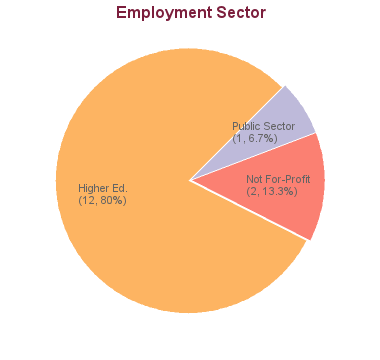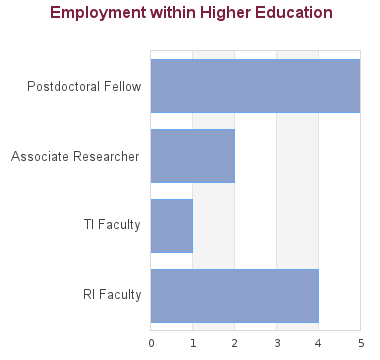Canadian Immigration Updates
Review details about the recently announced changes to study and work permits that apply to master’s and doctoral degree students. Read more
Overview
Oceanographers investigate both fundamental and applied problems relating to the physics, mathematics, biology, chemistry, and geology of the sea, often working across traditional academic disciplines. Research carried out both independently and in collaboration with federal government laboratories occurs in many different oceanographic regimes, including coastal BC fjords, the inland sea of the Strait of Georgia, open ocean regions of the Subarctic Pacific, and many other locations, including the Arctic and Antarctic Oceans. The types of problems that can be studied include fundamental questions about the flow of stratified fluids at scales ranging from tens of meters to thousands of kilometers, applied research in estuaries, coastal, and deep-ocean processes, general ocean circulation and climate change issues, marine chemistry, geochemistry, and biogeochemistry, natural product chemistry, marine viruses, fisheries oceanography, plankton ecology and physiology, and primary production of the sea. The Department is well equipped to carry out research in the field (using either its own boat or larger vessels in the oceanographic fleet), at the laboratory bench, and in the numerical heart of a computer. Most problems involve aspects of all three.
Students in Oceanography may select courses, depending on their interest, from the following areas of specialization:
-biological oceanography
-marine chemistry and geochemistry
-physical oceanography and atmospheric sciences
Students are encouraged to broaden their knowledge by taking courses outside their area of specialization. Courses related to Oceanography are also offered in the Departments of Botany, Chemistry, Civil Engineering, Geography, Physics and Astronomy, and Zoology.
What makes the program unique?
The Program builds on a proven record of accomplishments of the core faculty of the Earth, Ocean and Atmospheric Sciences Department that supervised several hundred graduate students. The program brings together 12 full-time faculty allowing students to choose from wide range of concentrations such as biological oceanography, chemical oceanography, and physical oceanography.
Quick Facts
Program Enquiries
Contact the program
Admission Information & Requirements
1) Check Eligibility
Minimum Academic Requirements
The Faculty of Graduate and Postdoctoral Studies establishes the minimum admission requirements common to all applicants, usually a minimum overall average in the B+ range (76% at UBC). The graduate program that you are applying to may have additional requirements. Please review the specific requirements for applicants with credentials from institutions in:
Each program may set higher academic minimum requirements. Please review the program website carefully to understand the program requirements. Meeting the minimum requirements does not guarantee admission as it is a competitive process.
English Language Test
Applicants from a university outside Canada in which English is not the primary language of instruction must provide results of an English language proficiency examination as part of their application. Tests must have been taken within the last 24 months at the time of submission of your application.
Minimum requirements for the two most common English language proficiency tests to apply to this program are listed below:
TOEFL: Test of English as a Foreign Language - internet-based
Overall score requirement: 100
Reading
22
Writing
22
Speaking
23
Listening
22
IELTS: International English Language Testing System
Overall score requirement: 7.0
Reading
6.5
Writing
6.5
Speaking
7.0
Listening
6.5
Other Test Scores
Some programs require additional test scores such as the Graduate Record Examination (GRE) or the Graduate Management Test (GMAT). The requirements for this program are:
The GRE is not required.
2) Meet Deadlines
January 2026 Intake
Application Open Date
01 April 2025Canadian Applicants
International Applicants
September 2026 Intake
Application Open Date
01 October 2025Canadian Applicants
International Applicants
January 2027 Intake
Application Open Date
01 April 2026Canadian Applicants
International Applicants
3) Prepare Application
Transcripts
All applicants have to submit transcripts from all past post-secondary study. Document submission requirements depend on whether your institution of study is within Canada or outside of Canada.
Letters of Reference
A minimum of three references are required for application to graduate programs at UBC. References should be requested from individuals who are prepared to provide a report on your academic ability and qualifications.
Statement of Interest
Many programs require a statement of interest, sometimes called a "statement of intent", "description of research interests" or something similar.
Supervision
Students in research-based programs usually require a faculty member to function as their thesis supervisor. Please follow the instructions provided by each program whether applicants should contact faculty members.
Instructions regarding thesis supervisor contact for Doctor of Philosophy in Oceanography (PhD)
Citizenship Verification
Permanent Residents of Canada must provide a clear photocopy of both sides of the Permanent Resident card.
4) Apply Online
All applicants must complete an online application form and pay the application fee to be considered for admission to UBC.
Research Information
Research Facilities
In 2012 the new Earth Sciences Building was completed. The $75 million facility was designed to inspire collaboration and creativity across disciplines.
Tuition & Financial Support
Tuition
| Fees | Canadian Citizen / Permanent Resident / Refugee / Diplomat | International |
|---|---|---|
| Application Fee | $116.25 | $168.25 |
| Tuition * | ||
| Installments per year | 3 | 3 |
| Tuition per installment | $1,875.34 | $3,294.66 |
| Tuition per year (plus annual increase, usually 2%-5%) | $5,626.02 | $9,883.98 |
| Int. Tuition Award (ITA) per year (if eligible) | $3,200.00 (-) | |
| Other Fees and Costs | ||
| Student Fees (yearly) | $1,144.10 (approx.) | |
| Costs of living | Estimate your costs of living with our interactive tool in order to start developing a financial plan for your graduate studies. | |
All fees for the year are subject to adjustment and UBC reserves the right to change any fees without notice at any time, including tuition and student fees. Tuition fees are reviewed annually by the UBC Board of Governors. In recent years, tuition increases have been 2% for continuing domestic students and between 2% and 5% for continuing international students. New students may see higher increases in tuition. Admitted students who defer their admission are subject to the potentially higher tuition fees for incoming students effective at the later program start date. In case of a discrepancy between this webpage and the UBC Calendar, the UBC Calendar entry will be held to be correct.
Financial Support
Applicants to UBC have access to a variety of funding options, including merit-based (i.e. based on your academic performance) and need-based (i.e. based on your financial situation) opportunities.
Program Funding Packages
All full-time students who begin a UBC-Vancouver PhD program in September or January will be provided with a funding package of at least $25,500.00 CAD plus tuition fee coverage for each of the first four years of their PhD. The funding package may consist of any combination of internal or external awards, teaching-related work, research assistantships, and graduate academic assistantships. Please note that many graduate programs may provide funding packages that are substantially greater than above amount per year. Please check with your prospective graduate program for specific details of the funding provided to its PhD students.
Average Funding
- 7 students received Teaching Assistantships. Average TA funding based on 7 students was $3,698.
- 10 students received Research Assistantships. Average RA funding based on 10 students was $11,371.
- 8 students received Academic Assistantships. Average AA funding based on 8 students was $3,767.
- 13 students received internal awards. Average internal award funding based on 13 students was $16,937.
- 4 students received external awards. Average external award funding based on 4 students was $34,417.
Review methodology
Scholarships & awards (merit-based funding)
All applicants are encouraged to review the awards listing to identify potential opportunities to fund their graduate education. The database lists merit-based scholarships and awards and allows for filtering by various criteria, such as domestic vs. international or degree level.
Graduate Research Assistantships (GRA)
Many professors are able to provide Research Assistantships (GRA) from their research grants to support full-time graduate students studying under their supervision. The duties constitute part of the student's graduate degree requirements. A Graduate Research Assistantship is considered a form of fellowship for a period of graduate study and is therefore not covered by a collective agreement. Stipends vary widely, and are dependent on the field of study and the type of research grant from which the assistantship is being funded.
Graduate Teaching Assistantships (GTA)
Graduate programs may have Teaching Assistantships available for registered full-time graduate students. Full teaching assistantships involve 12 hours work per week in preparation, lecturing, or laboratory instruction although many graduate programs offer partial TA appointments at less than 12 hours per week. Teaching assistantship rates are set by collective bargaining between the University and the Teaching Assistants' Union.
Graduate Academic Assistantships (GAA)
Academic Assistantships are employment opportunities to perform work that is relevant to the university or to an individual faculty member, but not to support the student’s graduate research and thesis. Wages are considered regular earnings and when paid monthly, include vacation pay.
Financial aid (need-based funding)
Canadian and US applicants may qualify for governmental loans to finance their studies. Please review eligibility and types of loans.
All students may be able to access private sector or bank loans.
Foreign government scholarships
Many foreign governments provide support to their citizens in pursuing education abroad. International applicants should check the various governmental resources in their home country, such as the Department of Education, for available scholarships.
Working while studying
The possibility to pursue work to supplement income may depend on the demands the program has on students. It should be carefully weighed if work leads to prolonged program durations or whether work placements can be meaningfully embedded into a program.
International students enrolled as full-time students with a valid study permit can work on campus for unlimited hours and work off-campus for no more than 24 hours a week during academic sessions.
A good starting point to explore student jobs is the UBC Work Learn program or a Co-Op placement.
Tax credits and RRSP withdrawals
Students with taxable income in Canada may be able to claim federal or provincial tax credits.
Canadian residents with RRSP accounts may be able to use the Lifelong Learning Plan (LLP) which allows students to withdraw amounts from their registered retirement savings plan (RRSPs) to finance full-time training or education for themselves or their partner.
Please review Filing taxes in Canada on the student services website for more information.
Cost Estimator
Applicants have access to the cost estimator to develop a financial plan that takes into account various income sources and expenses.
Career Outcomes
17 students graduated between 2005 and 2013. Of these, career information was obtained for 15 alumni (based on research conducted between Feb-May 2016):


RI (Research-Intensive) Faculty: typically tenure-track faculty positions (equivalent of the North American Assistant Professor, Associate Professor, and Professor positions) in PhD-granting institutions
TI (Teaching-Intensive) Faculty: typically full-time faculty positions in colleges or in institutions not granting PhDs, and teaching faculty at PhD-granting institutions
Term Faculty: faculty in term appointments (e.g. sessional lecturers, visiting assistant professors, etc.)
Sample Employers in Higher Education
Oregon State University (2)Dalhousie University
Douglas College
University of Victoria
Princeton University
Oregon Health and Science University
Universidad Santo Tomás
University of Connecticut
University of California - Santa Cruz
University of British Columbia
Sample Employers Outside Higher Education
North Pacific Marine Science Organization (PICES)Government of Canada
Hakai Institute
Sample Job Titles Outside Higher Education
Research Scientist (2)Visiting Scientist
PhD Career Outcome Survey
You may view the full report on career outcomes of UBC PhD graduates on outcomes.grad.ubc.ca.Disclaimer
These data represent historical employment information and do not guarantee future employment prospects for graduates of this program. They are for informational purposes only. Data were collected through either alumni surveys or internet research.Enrolment, Duration & Other Stats
These statistics show data for the Doctor of Philosophy in Oceanography (PhD). Data are separated for each degree program combination. You may view data for other degree options in the respective program profile.
ENROLMENT DATA
| 2023 | 2022 | 2021 | 2020 | 2019 | |
|---|---|---|---|---|---|
| Applications | 6 | 9 | 12 | 6 | 14 |
| Offers | 2 | 1 | 4 | 1 | 5 |
| New Registrations | 1 | 1 | 4 | 1 | 4 |
| Total Enrolment | 19 | 18 | 21 | 20 | 22 |
Completion Rates & Times
Disclaimer
Research Supervisors
Supervision
Students in research-based programs usually require a faculty member to function as their thesis supervisor. Please follow the instructions provided by each program whether applicants should contact faculty members.
Instructions regarding thesis supervisor contact for Doctor of Philosophy in Oceanography (PhD)
Advice and insights from UBC Faculty on reaching out to supervisors
These videos contain some general advice from faculty across UBC on finding and reaching out to a supervisor. They are not program specific.
Doctoral Citations
| Year | Citation |
|---|---|
| 2014 | The Arctic is one of the most threatened environments because of rapid climate change. Dr. Chenard's work examined viruses infecting polar bacteria in Arctic freshwater regions, and she discovered previously unknown groups of viruses. Her work provides new tools to study the diversity of these viruses and their effects on polar bacteria. |
| 2014 | Dr. Shelford examined the role of viruses that infect bacteria in the ocean. She provides evidence that viruses are adding back vital nitrogen to the ocean for the benefit of other organisms such as phytoplankton, and this helps to sustain marine food webs. Her work contributes to the field of marine microbial nutrient cycling. |
| 2014 | Dr. Gurney constructed the first marine ecosystem model of the Subantarctic Prince Edward Achipelago. The model captured the food web of marine life and was able to reproduce past population dynamics and forecast potential effects of climate change. The model provides a tool for fisheries and conservation research at the islands. |
| 2014 | Dr. Brown examined the factors controlling carbon in the Arctic Ocean. Her research employed field-based measurements to infer the relative importance of several processes affecting carbon distributions in the water column and sea ice. This work advances our understanding of carbon cycling in the polar ocean and the impact of sea ice on this cycle |
| 2013 | Dr. Tommasi examined zooplankton populations in Rivers Inlet, a fjord in central BC. The research showed which zooplankton species are dominant under specific environmental conditions. Knowledge of how environmental forces shape zooplankton is essential to fisheries managers assessing how fish stocks such as salmon will vary in the future. |
| 2013 | Dr. Luo studied ocean processes such as circulation and carbon flux with chemical tracers. His research improved the methods we use, to better understand the role that oceans play in climate change. This work provides several promising future research perspectives for oceanography, which are especially beneficial to scientists who study climate change. |
| 2012 | Dr. Guo studied the physiological role of copper in marine phytoplankton, and elucidated, for the first time, the presence of two copper transport systems (a high and a low affinity). Her research highlights the importance of copper for phytoplankton growth and the complex interaction between iron and copper nutrition. |
| 2012 | Dr. Clarke Murray investigated recreational boats as a source of marine invasive species and found significant potential for initial introduction and regional spread of these species by the recreational fleet. This research will assist in the development of monitoring and management measures to prevent future invasions and protect biodiversity. |
| 2012 | Dr. Cassis studied the causes of cadmium levels, stress levels, and mortalities in cultured oysters. He worked closely with BC oyster farmers to improve their culture methods based on a better understanding of the marine environment. |
| 2011 | Dr. Riche quantified the seasonal circulation of seawater in the Strait of Georgia using sophisticated mathematics and a unique set of monthly observations taken over the years 2002 to 2005. He also quantified the seasonal growth and abundance of marine microscopic algae and showed that some of their nutrient requirements differed from estimates made in previous studies. |
Pages
Sample Thesis Submissions
Further Information
Specialization
Oceanographers investigate both fundamental and applied problems relating to the physics, mathematics, biology, chemistry, and geology of the sea, often working across traditional academic disciplines. Research carried out both independently and in collaboration with federal government laboratories occurs in many different oceanographic regimes, including coastal BC fjords, the inland sea of the Strait of Georgia, open ocean regions of the Subarctic Pacific, and many other locations, including the Arctic and Antarctic Oceans. The types of problems that can be studied include fundamental questions about the flow of stratified fluids at scales ranging from tens of meters to thousands of kilometers, applied research in estuaries, coastal, and deep-ocean processes, general ocean circulation and climate change issues, marine chemistry, geochemistry, and biogeochemistry, natural product chemistry, marine viruses, fisheries oceanography, plankton ecology and physiology, and primary production of the sea.
Program Website
Faculty Overview
Academic Unit
Program Identifier
Classification
January 2026 Intake
September 2026 Intake
January 2027 Intake
Program Enquiries
Contact the program
Departments/Programs may update graduate degree program details through the Faculty & Staff portal. To update contact details for application inquiries, please use this form.

Curious about life in Vancouver?
Find out how Vancouver enhances your graduate student experience—from the beautiful mountains and city landscapes, to the arts and culture scene, we have it all. Study-life balance at its best!




